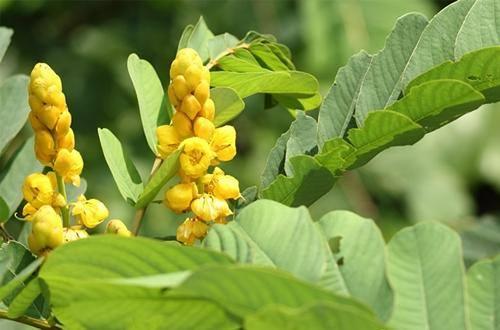Senna alata, also known as the candle bush or ringworm shrub, is a prominent medicinal plant revered for its impressive range of health benefits.

With its striking bright yellow flowers and unique, candle-like structure, this plant is not only eye-catching but also highly valued in traditional medicine, especially in tropical and subtropical regions.
From skin ailments to digestive issues, Senna alata has been used for generations to treat various health conditions.
This article will explore its benefits, common uses, and practical homemade applications.
Health Benefits of Senna alata
-
Antifungal Properties: One of the most well-known benefits of Senna alata is its antifungal action. The plant contains chrysophanic acid, a natural fungicide effective against fungi like ringworm and other dermatophytes. This makes it a go-to remedy for skin conditions such as ringworm, athlete’s foot, and other fungal infections.
Laxative Effects: Senna alata has potent laxative properties due to its anthraquinones, compounds that stimulate the colon and promote bowel movement. This property makes it a natural aid for relieving constipation and maintaining digestive health.
Antibacterial Benefits: Besides its antifungal properties, Senna alata also exhibits antibacterial effects. Extracts from its leaves can help reduce bacterial load on the skin, promoting faster healing and preventing secondary infections.
Anti-inflammatory Properties: The plant contains compounds that may help reduce inflammation. This makes it useful for treating minor skin irritations, insect bites, and conditions that involve redness and swelling.
Antioxidant Support: Senna alata is rich in natural antioxidants, which help combat free radicals and prevent cell damage. This contributes to overall wellness and can support the body’s natural defense system.
Wound Healing: Applied topically, Senna alata can accelerate the healing of minor cuts and abrasions due to its antimicrobial and soothing properties.
Skin Soothing: The leaves of the plant have emollient properties that can soothe and moisturize irritated skin, making them useful in homemade ointments or washes for dry and itchy skin.
Common Uses of Senna alata
Topical Treatment for Skin Ailments: The most popular use of Senna alata is as a topical remedy for fungal infections. A paste made from its leaves can be applied directly to the affected area to combat ringworm, eczema, and other skin conditions.
Herbal Laxative: Consuming a decoction or extract of the plant in controlled amounts can help stimulate bowel movements, providing relief from constipation.
Insect Bite Relief: The anti-inflammatory properties of Senna alata make it an effective treatment for relieving the discomfort and swelling caused by insect bites.
Natural Antiseptic Wash: A homemade infusion of Senna alata leaves can be used as a natural antiseptic wash for cleaning minor wounds and skin infections.
Homemade Applications of Senna alata
1. Leaf Paste for Skin Conditions
Ingredients: Fresh Senna alata leaves and water.
Method: Crush a handful of fresh leaves and add a few drops of water to create a paste. Apply the paste directly to the affected area and leave it on for 30 minutes before rinsing with lukewarm water. Repeat twice daily until improvement is noticed.
2. Antifungal Leaf Wash
Ingredients: Dried or fresh Senna alata leaves and water.
Method: Boil a cup of water and add a handful of dried or fresh leaves. Let it simmer for 10-15 minutes, strain, and allow it to cool. Use the solution to wash the skin or affected areas twice daily for best results.
3. Laxative Decoction
Ingredients: Senna alata leaves (dried) and water.
Method: Boil 1-2 teaspoons of dried leaves in 250 ml of water for about 10 minutes. Strain and drink once cooled. This should be consumed in moderation and only when necessary, as overuse can lead to discomfort.
4. Insect Bite Relief Ointment
Ingredients: Fresh Senna alata leaves and a carrier oil (coconut oil or olive oil).
Method: Infuse fresh leaves in warm carrier oil by simmering on low heat for 30 minutes. Strain and store the oil in a clean container. Apply a small amount to insect bites to relieve itching and swelling.

Precautions and Disclaimer
While Senna alata offers a range of health benefits, it is important to use it responsibly. Excessive use of its laxative properties can lead to gastrointestinal issues such as cramps and diarrhea
Pregnant women, nursing mothers, and individuals with chronic health conditions should consult a healthcare professional before incorporating Senna alata into their routine. Always test a small area of the skin before using it to rule out any potential allergic reactions.
Conclusion
Senna alata is a versatile and powerful medicinal plant with centuries of traditional use for treating a variety of ailments.
Whether applied topically for skin issues, consumed as a mild laxative, or used to soothe bites and irritation, this plant proves to be a valuable addition to any natural health repertoire.
By following the homemade application methods outlined here, you can make the most of Senna alata’s benefits while maintaining safe and effective use.
News
VIDEO: A This Morning staff member has leaked explicit footage of Gino D’Acampo appearing completely n@ked while making inappropriate comments to his co-hosts, leaving audiences disgusted.
A past moment from This Morning featuring Gino D’Acampo has resurfaced, showing the celebrity chef appearing nearly naked on live television. The Italian-born chef, known for his playful antics, once presented a cooking segment wearing only an apron and a knitted ‘willy…
SNL’s Lorne Michaels is facing major backlash after viewers exposed the real reason he invited Kim Kardashian to appear on the show’s 50th-anniversary special.
The announcement of Kim Kardashian’s participation in “Saturday Night Live’s” (SNL) 50th Anniversary Special has elicited a range of reactions from fans and observers. While some view her inclusion as a testament to her cultural influence, others express confusion, questioning…
Ranvir Singh of Good Morning Britain left everyone in shock after confessing the huge price she’s willing to pay to stay with her much younger boyfriend: “I would sacrifice my entire fortune if he asked me to marry him.”
For over a decade, Ranvir Singh has been a familiar face on Good Morning Britain, first stepping into the spotlight as a political editor before becoming a co-host alongside Kate Garraway and Susanna Reid. In addition to her work on…
Strictly’s Nikita Kuzmin fought back tears as he revealed the devastating fear of LOSING EVERYONE HE LOVES: “I’m still struggling to reach my family…” What’s happening?
Nikita Kuzmin, best known for his dazzling performances on Strictly Come Dancing, was visibly emotional during his recent appearance on Loose Women. The professional dancer, currently touring the UK with the Strictly Come Dancing Live tour, took a break from…
Kate Garraway from GMB has sparked deep concerns after making an alarming statement about abandoning her children to reunite with her deceased husband. What pushed her to this point?
In a recent interview, Kate Garraway, co-host of ITV’s “Good Morning Britain,” opened up about the profound impact of her late husband Derek Draper’s final wish for her and their children, Darcey and Billy. Derek, a former political advisor and…
Alison Hammond from ITV This Morning faced outrage after viewers exposed the true reason for her absence from the latest episode: “She should be sacked…”
Fans of This Morning were left puzzled on Friday, February 7, when Alison Hammond was noticeably absent from the show, leaving viewers wondering about the reason behind her sudden disappearance. Alison, who typically co-hosts with Dermot O’Leary every Friday, was…
End of content
No more pages to load











